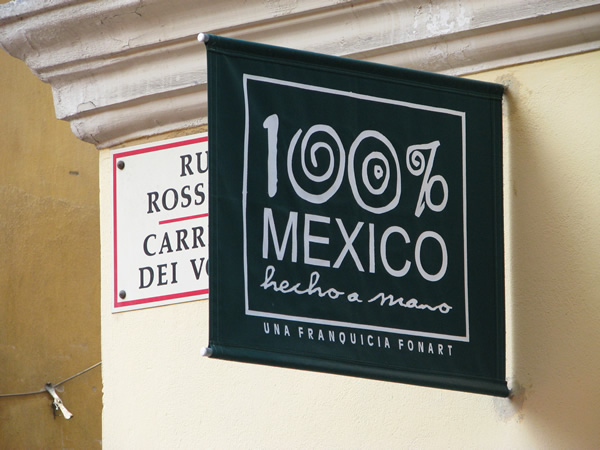How to Wake Up to a New Job Abroad
By Caroline Nye

|
|
Waking up to new adventures overseas, here at a clothing store in France selling Mexican-made clothes, for example.
|
In the first of her series of articles on jobs abroad, Caroline offers an overview of what is involved in getting started before she tells the stories of the adventures she experienced in different countries.
Many of us have deep desires to travel, some from childhood, others through reading, television, or word of mouth. Some satisfy these desires through small, tasty portions, a yearly vacation, and a more extended, single trip. Others pack their life into a backpack and head into the unknown, planning a long-term feast. The problem is that the world can be costly if you travel without working unless you're a millionaire. No matter how cheap the accommodation in India or the food in Marrakech, your dollars eventually turn into cents or credit as a last resort. So what should you do when you peer into your wallet and find only a rupee note, a coin with a hole in the middle, and some indistinguishable fluff? Two options are available to you. Head home or stay and make some money.
Various factors will affect your ability to find and acquire work in any country, and we will explore some creative but tried and tested options in this series of stories.
Visas and Work Permits
First and most important is whether you have a legal right to work in that country. Most countries will ask for a visa unless your country of origin is part of something like the EU. A fortunate few travelers have dual nationality, which allows them to travel and work abroad more easily. The most common option is to go through an organization such as BUNAC to secure a visa, especially if you want to work in Australia, New Zealand, or Canada.
Companies such as BUNAC allow U.S. citizens to gain a work visa in Australia, New Zealand, and Canada if they are between 18 and 30 (35 for Canada). Be aware that going through such organizations will always require a program fee. Other countries have their own regulations regarding non-citizens working. I know many people who have worked in Europe without any legal right to do so. You must be aware of and ready to deal with the legality issue. But many companies in Europe will pay cash under the table.
Still others may find work for the duration of their tourist visa in resort areas. Some professional workers, such as nurses and engineers, can enter other countries through sponsorship programs. Paid internships are another option whereby an individual can be temporarily sponsored by a company or organization.
Some professional workers, such as nurses and engineers, can enter other countries through sponsorship programs. Paid internships are another option whereby an individual can be sponsored by a company or organization on a temporary basis.
Another option, if you intend to continue your studies, might be to do graduate work in the U.K. or Europe. Under these conditions, it is sometimes possible to work part-time. However, this is a costly way to obtain a work visa!
Types of Available Jobs
An critical factor in your job search will be the jobs available and your ability to do them. If you are in Bangkok and don't speak Thai, you probably wouldn't apply for a job in the hospital. If you want to save money, find something simple, such as bar or hotel work. But if you speak the language, many options open up to you. Knowing a language can increase your enjoyment of your time and often your salary. For example, if you are trained in nursing, teaching, or social work, the opportunities can be inexhaustible in many countries. In general, you can apply for any semi-skilled or unskilled job as long as you speak the local language. If you are fortunate enough to speak several languages fluently, you will find many more job opportunities.
Essential factors many people need to consider are the living costs when you're not at work! If you find a job running a bar in Thailand, you can easily rent your own place. This is where my travel specialty comes into play: "Waking up at Work!"
Jobs all over the world provide room and board along with the position. Such work might range from interning on an organic farm to jobs in hotels that offer room and board. You can usually expect these jobs to pay less. Still, they often provide a surprising opportunity to save a little while living a fun and exciting life abroad. These jobs also diminish the stress of paying bills, finding accommodations, and living in less pleasant areas of the country where you are staying. The articles in this series discuss jobs where you literally wake up at work!

|
Caroline Nye has traveled and worked extensively all over the world, working in organic farming, wildlife guiding, teaching, and musical performance, as well as volunteering in various international development projects. She has had articles and short stories published in Amateur Photographer (UK), Matador Travel, and The Healing Project book series. She won a Bunac Green Cheese scholarship for humorous writing. Caroline is currently managing a dance team in Spain.
|
|
